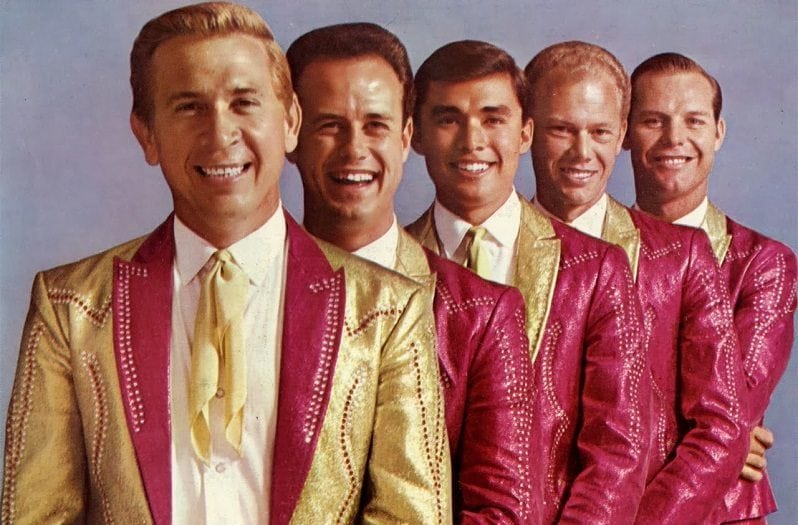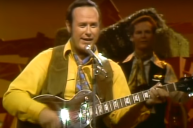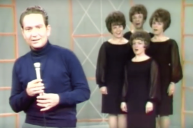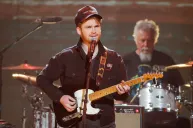From the Tennessee Three to the 400 Unit, numerous backing bands in the annals of country music were synonymous with a seminal solo artist. So rich is this history that those two fine outfits don't even crack the top five.
Videos by Wide Open Country
This roundup of five talented and influential backing bands spanning country music history considers the talents, longevity and historical impact of the players involved and their band leaders. An attempt was made to not list similar bands. For example, since the Buckaroos represent the same time and place as Merle Haggard's undeniably important Strangers, there's no need to list both.
The Buckaroos
The greats involved with Buck Owens' famed backup band over the years would be an essay unto itself. For brevity's sake, a quick look at the classic lineup is enough to establish the Buckaroos as a stacked and influential backing band. Don Rich (guitar, fiddle) needs no introduction, and in Owens' seminal period of the 1960s he was also joined on stage and in the studio by three additional genre-shaping talents.
Steel guitarist Tom Brumley, son of famed gospel composer Albert E. Brumley ("I'll Fly Away," "Turn the Radio On"), helped define the Bakersfield Sound and later contributed to some of Ricky Nelson's more country-leaning material. Doyle Holly took Merle Haggard's spot as the Buckaroos' bassist, adding his own stamp to West Coast country. Lastly, Willie Cantu sat behind the drum kit for most of this era, setting the pace for the greatest country band to coexist on the same level as teenage rock 'n' roll.
Willie Nelson's Family
Nelson's backing band lives up to its name, offering his kin folks a chance to work for the family business. Sons Lukas and Micah are no strangers to playing on stage with dad. For decades, their aunt Bobbie has played piano in the group. Her contributions gave us the most underrated version of Willie--the acoustic gospel and folk purist heard on the Family Bible and Spirit albums.
In addition to blood family, Nelson's side players include brothers of the road. There's Paul English, subject of the song "Me and Paul" and Nelson's longtime drummer, and the preeminent harmonica player in popular music, Mickey Raphael. Other noteworthy members of Nelson's road family include guitarists Johnny Bush and Jody Payne. Whoever's in the lineup, the long-running band continues its invaluable role in the octogenarian's still-relevant career.
The Hot Band
https://www.youtube.com/watch?v=ocNPcvLaloo
When Emmylou Harris needed a "hot band" to suit Warner Brothers' desires, she went above and beyond rounding up established talents. The original version of the band centered on the talents of former Ricky Nelson guitarist James Burton and Crickets pianist Glen Hardin.
Other veterans went on to accentuate their songbird boss' God-given talents, but what stands out about about the Hot Band was the presence of other young performers primed for their own legendary solo careers. In the 1970s, promising songwriter Rodney Crowell cut his teeth in the music business as Harris' rhythm guitarist and backup vocalist. Upon Crowell's departure, bluegrass picker and future Country Music Hall of Famer Ricky Skaggs helped guide Harris' move to a more traditional sound as her mandolin player and fiddler. With Crowell and Skaggs' involvement and Harris' now-legendary status, the Hot Band proved to be a hot bed for traditionally-minded talents.
The Texas Playboys
As country's first big-name band, Bob Wills' supporting cast made sure that Texas swing wasn't just a fad while laying the groundwork for modern-day Texas music. In a rare case where the name preceding the band on the marquee wasn't lead singer, Wills set the standard for country music fiddling while backing up such vocalists as Tommy Duncan and Leon McAuliffe.
The band first emerged in the 1930s, a time when live radio launched local musicians to widespread stardom. Thus began a star-studded band, featuring such talents as Duncan on piano, June Whalin as rhythm guitarist and steel guitarist and bassist Kermit Whalin. Other noteworthy Playboy alums include new Hall of Famer Johnny Gimble.
Read More: 10 Former Bands of Your Favorite Country Stars
By blending jazz and other influences with country and western sounds, Wills' band pioneered something new that impacted other important bands, namely Merle Haggard's Strangers and, more blatantly, Asleep at the Wheel. For his work as a genre-defining band leader, Wills got inducted into the Country Music Hall of Fame in 1968 and the Rock and Roll Hall of Fame in 1999.
The Texas Troubadours
Ernest Tubb didn't ride alone on his journey from a young Jimmie Rodgers devotee to a key player in the popularization of honky tonk music. Like other bands on this list, his Texas Troubadours went from a well-oiled unit to a launching pad for future stars. With a flashy look suitable for the influx of color televisions and songs that kept that high and lonesome sound in the spotlight, the Texas Troubadours pushed country music forward in the early 1960s while honoring its roots.
Tubb's revolving door of backing musicians reads like a who's-who of '50s and '60s country music. Organist turned Nashville Sound producer Owen Bradley sat in on some sessions, drummer Jack Greene went on to become a huge solo star, future Hee Haw house band guitarist Leon Rhodes, steel guitar legend Buddy Emmons and "Country Bumpkin" singer Cal Smith are just a few examples of the talents to collaborate with Tubb.




